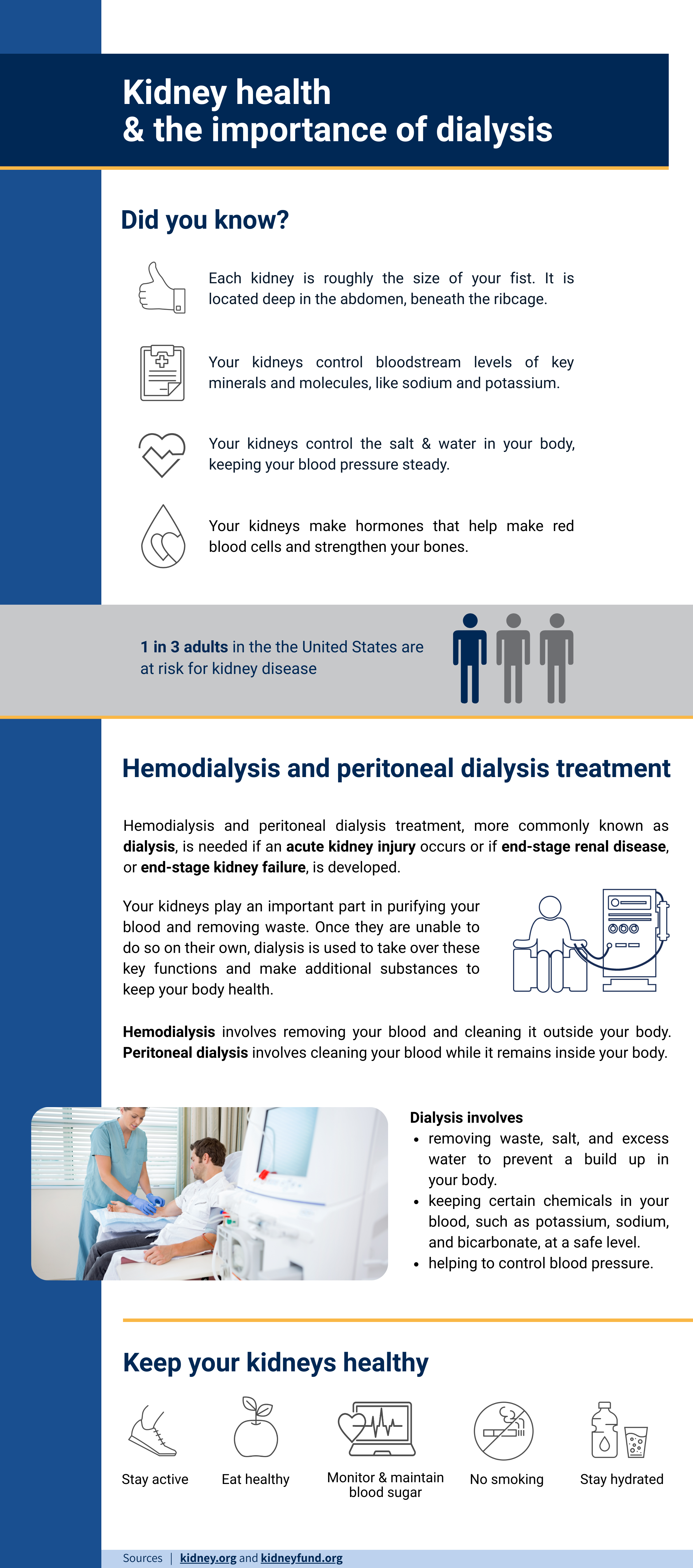The kidneys play an important role in everyday health. Kidneys purify the bloodstream, removing waste and toxins, while making additional substances to help keep the body healthy and functioning properly. Given their importance, it is detrimental if kidney function should decline, and disease develop. Keeping the kidneys healthy through an active lifestyle, nutritional diet, avoiding tobacco products, and maintaining blood sugar and blood pressure levels is important. Today, one-in-three adults in the United States are at risk for kidney disease and require treatment to support or replace key functions performed by the kidneys.
Hemodialysis and peritoneal dialysis treatment
 For patients with low-stage kidney disease, their kidneys may still be able to perform some vital services. Rather than more intensive treatment, kidneys are supported through medications used to treat complications of kidney disease including high blood pressure, high cholesterol, swelling, and osteoporosis. As kidney function continues to decline, however, additional treatment may be needed in the form dialysis.
For patients with low-stage kidney disease, their kidneys may still be able to perform some vital services. Rather than more intensive treatment, kidneys are supported through medications used to treat complications of kidney disease including high blood pressure, high cholesterol, swelling, and osteoporosis. As kidney function continues to decline, however, additional treatment may be needed in the form dialysis.
When kidneys are unable to perform important functions on their own, dialysis is used to perform the functions for them. The two main types of dialysis – hemodialysis and peritoneal dialysis – purify the blood, removing salt, water, and toxins to prevent an excess fluid buildup. Hemodialysis removes blood from the patient and performs the treatment while it is outside the body. Peritoneal dialysis purifies blood while it remains inside the body.
Those patients who have an Acute Kidney Injury may be on dialysis for a short period of time, while those who develop End-Stage Renal Disease (ESRD), or End-Stage Kidney Failure, typically remain on dialysis treatment for the rest of their lives. A kidney transplant may be possible for those on permanent dialysis. For those patients with a successful kidney transplant, dialysis treatment may be stopped.
Kidney disease, SSDI benefits, and Medicare
Individuals who are unable to work because of chronic kidney disease, may qualify for Social Security Disability Insurance (SSDI) benefits. The Social Security Administration (SSA) has strict guidelines they use when determining eligibility, and in general, at least one of the following must apply:
-
- You have chronic kidney disease and need dialysis.
- You have chronic kidney disease and have had a kidney transplant within the last year.
- You have chronic kidney disease with reduced kidney function, and at least one of the following:
- Renal osteodystrophy: a bone disease leading to severe bone pain and abnormalities caused by failing kidneys.
- Peripheral neuropathy: a nerve disease that causes pain, numbness, tingling and muscle weakness in various parts of the body from toxins the kidneys could not filter out.
- Fluid overload syndrome: a condition where water and salt are retained in the body and causes abnormally large blood vessels with high blood pressure, swelling of the skin, or a BMI of 18.0 or less from weight loss.
- Nephrotic syndrome: a condition in which protein is lost in urine, shown in testing twice in one year, with swelling of the skin for at least 90 days.
- You have chronic kidney disease and the complications have resulted in at least three hospitalizations in one year.
- These hospitalizations must occur 30 or more days apart and must last 48 hours, including hours in a hospital emergency department immediately before the hospitalization.
For individuals with ESRD, special allowance is given to provide Medicare coverage to help deal with the cost of dialysis, as the treatment can be very expensive. For most patients, Medicare covers 80 percent of the cost of the treatment. When Medicare begins varies depending on the type of treatment being received:
-
- Those patients receiving hemodialysis or peritoneal dialysis qualify for Medicare beginning with their fourth month of continuous treatment.
- Patients who receive home dialysis qualify for Medicare coverage with their first month of treatment.
- Kidney transplant patients qualify for Medicare coverage beginning with the month they are admitted to the hospital for their transplant.
Medicare coverage continues for until 12 months after dialysis ends or 36 months after a kidney transplant, unless treatment begins again, another transplant is needed, or the individuals qualifies due to age or SSDI eligibility.
Despite having chronic kidney disease, these criteria in no way guarantee that you will or will not be approved for SSDI benefits. SSDI can be a life-changing temporary, or permanent, form of assistance that men and women of all ages and backgrounds depend on during difficult times. It is our privilege at Brown & Brown Absence to provide expert advice and assistance to these individuals and their families.
Nothing in this post is intended as advice or a suggestion to elect or not elect to claim benefits of any kind, including Social Security benefits, nor is it intended as financial advice in any way. The decision to claim benefits is a personal one that is contingent upon each individual’s unique circumstances. Nothing herein is considered medical advice, diagnosis or treatment.




